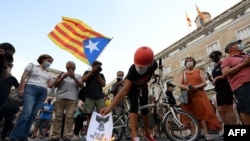“There is no king in Catalonia!” cried the protesters as they burned pictures of King Felipe VI.
As the monarch visited Barcelona Wednesday, the strength of feeling was apparent among separatists who want to rid the turbulent region of any trace of Spain.
Despite the bitter divisions in Catalonia over the issue of independence, Spain's Socialist Prime Minister Pedro Sánchez is about to take what analysts say is an audacious gamble which he hopes will diffuse tensions that have divided the country for years.
By early July, Spain's leftist government is expected to order the partial pardon of 12 convicted Catalan separatists, but the move is likely to prove politically costly at the polls for the minority administration.
In 2019, nine Catalan separatists were handed prison sentences of between nine and 13 years for sedition. Three others were found guilty of disobedience but were not imprisoned.
All were convicted over their roles in a 2017 independence referendum that was later declared illegal by Spain's Constitutional Court and a failed declaration of independence days later.
The ill-fated bid to split from Spain caused the deepest political crisis since a failed military coup d'etat in 1981.
Sánchez' decision may mark a turning point in a long-running territorial dispute with separatists in the wealthy northeastern region of Spain.
It is likely to guarantee the support of moderate Catalan nationalists for Spain's left-wing coalition government which depends on the support of minority parties to pass legislation.
However, the issue of pardons has provided a rallying cry for parties on the Spanish right.
Protests
About 25,000 people took to the streets of Madrid Sunday last to protest against plans for pardons, claiming they will threaten national unity.
"We must stop this. Sanchez is selling out Spain," Begoña Lopez Elcacho, a protester, told VOA.
In a stormy debate in the Spanish parliament Wednesday, the leader of the conservative People's Party Pablo Casado repeated Sanchez's earlier promises never to pardon the convicted separatist leaders.
Sánchez replied by saying a previous conservative government deployed thousands of police to try to stop the 2017 referendum, resulting in clashes in the streets of Catalonia and international condemnation.
“With the (Socialists) no referendums, no unilateral declarations of independence. What type of program do you have for Spain if there is no plan for Catalonia or the Basque Country?” the prime minister said.
However, the Supreme Court, which convicted all 12 Catalan leaders, advised the government against issuing the pardons.
In a ruling last month, the judges said they saw no reason for leniency because those in prison had not shown “the slightest trace of remorse”.
Sánchez has made it clear that his government, which has the final say in pardoning convicted offenders, will disregard the court's ruling, but they will be returned to prison if they re-offend.
Appeal to show 'magnanimity'
The prime minister appealed last week to Spaniards to show “magnanimity” on the thorny issue of pardoning secessionists who sought to break up the country.
However, around 63% of Spaniards oppose granting the pardons while 25% backed and about 6% were indifferent, according to a poll published Sunday for nuisdiario.es, a Spanish online newspaper.
Within Catalonia, reaction has been different, with the moderate nationalist party Catalan Republican Left, which heads the regional government in Barcelona, cautiously backing the plan.
In an interview with Reuters Monday, Pere Aragones, the Catalan regional president, said the pardons “should be a first step in a negotiation stage, of recognizing a national conflict between Catalonia and the Spanish state,” to allow an eventual agreed referendum to allow “Catalan citizens to decide”.
Analysts played down the political damage the pardons could do Sanchez and stressed it was a necessary move to ease the political trench warfare between Madrid and Barcelona.
“In Catalonia there is considerable opposition to the jailing of these leaders so this will help to diffuse the tension. However, across the rest of Spain, where it seems there is considerable opposition so this will not be popular,” said Lluis Orriols, a political science professor at Carlos III University in Madrid in an interview with VOA.
“In the short term, the government could be punished at the polls but beyond that if they lose votes of Socialist supporters, they may gain because they will be able to govern better because they will have the support of nationalist parties. I do not think the damage will be long term,” Orriols said.
Sanchez faces a general election in 2023 when any fallout from the pardons should be behind him, Orriols said, but the deeply divisive issue of Catalan independence will not be resolved for years to come.
A poll published last month for La Vanguardia, a Barcelona newspaper, found 52% of people surveyed were against independence while 42% supported splitting from Spain.
Spain's Leaders to Pardon Catalan Separatists, Despite Protests




